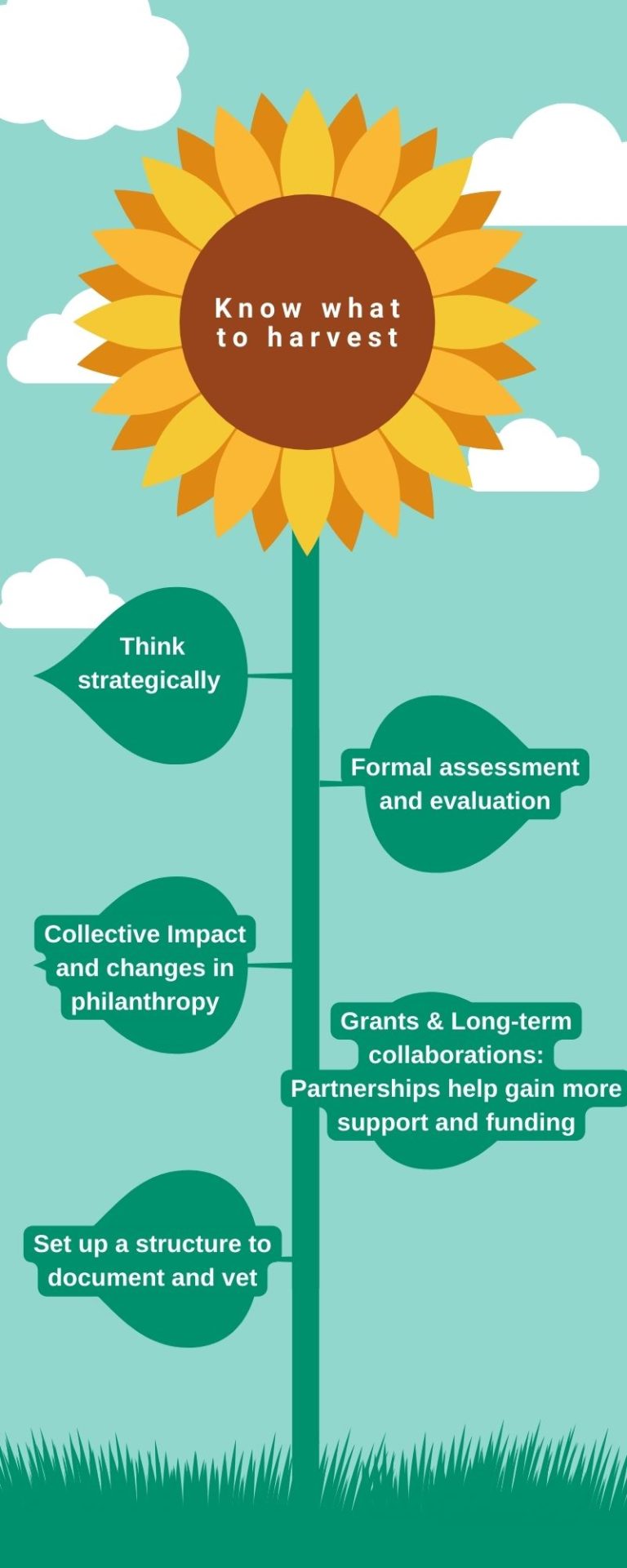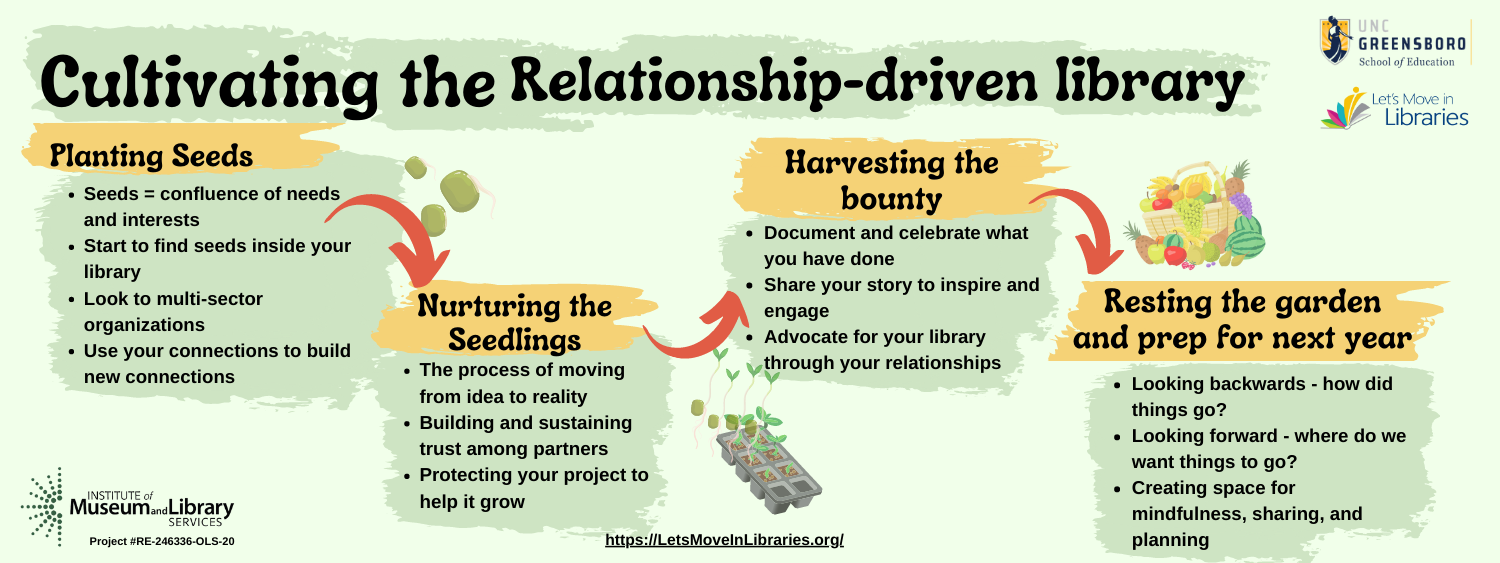Step 3 – Harvesting the bounty
This step is focused on documenting and celebrating what comes out of the work you and your partners have put into nourishing your seedling, or your idea.
We are focused on that moment when a seedling becomes a fruitful plant.
In the language of libraries, we are focused on the moment in which our partnerships & relationships become programs & services, and then on the moment immediately thereafter when we celebrate those programs and services.
It’s critical to take the time to document and celebrate what comes from your relationships. Historically, many farmers celebrate the end of the harvest with a big meal called the harvest supper, to which all who helped are invited.
Our job is to translate these traditions into our libraries and into our communities. What traditions do you have to celebrate the culmination of new initiatives at your library? In your community? What traditions could you start?
Read on to learn more and contact us to share your experiences.

You and your partners have put so much work into taking an idea and tuning it into a reality.
It’s critical that you, your partners, and your community take the time to celebrate what comes from your collective labors, and also to make sure that this bounty nourishes those that need sustenance.
Know what you’ve grown
Harvesting your bounty requires being able to discern a rutabaga from a weed. Do you know what you’re looking for?
Put simply, do you have mechanisms in place to document what you’re doing, and, then, to understand what exactly it is you’re documenting?
Without documentation how can you celebrate what has come from your relationships?
Here are three ways to get started:
- Culture of documentation
- Social media advocates
- Stories of impact
What are some simple strategies you can use to document what you’re doing? Let us know and we’ll add your voice to this toolkit.

If you’re looking looking to document what you’re doing, you need to set up sticky structures to ensure things get documented. But structures are only as good as the cultures that surround them. What cultures of documentation can you create to ensure that the work you and your partners engage in is documented, recorded, and shared?
For instance, at the Richland Library in Columbia, South Carolina, when you enter the main library one of the first things you see is a poster board announcing that in the public space of the library you may be photographed and videotaped. As the library’s FAQ states, “Because all Richland Library programs are free and open to the public, individuals and media are invited to attend and photograph and/or film any part of the program.”
Now, you do not want to be filming people all the time, but you do want to create a culture in which it is expected that you’ll be documenting the things you are doing and then sharing that documentation.
You can also “outsource” some of that work to others. Denver Public Library’s Social Media Advocate program “is designed to give our biggest supporters an opportunity to engage with us while helping us expand to new audiences we wouldn’t normally be able to reach.” In other words, it is a structured system to enable advocates (and partners!) to document and celebrate all the things that libraries do in and with communities.
Stories of Impact
Another model appears in Charlotte Mecklenburg Library’s Stories of Impact, a system to collect from library staff, from library patrons, and from library partners documentation about how libraries are impacting peoples’ lives. Learn more about the system here, here, here, and here.
There is no ONE best way to document your garden and to keep on eye on what is growing out of your seedlings. However, if you keep an eye on the prize – what do you and your partners WANT your seedlings to become – you’ll be on the way to success.
Celebrate the harvest season
The harvest season is a time for celebration, but often in libraries we don’t set aside the time to celebrate the fruits of our bounty.
 Harvesting your bounty gives you and the library the tools you need to toot your horn to drive resources to the library. Use the documentation you’ve collected to share your story!
Harvesting your bounty gives you and the library the tools you need to toot your horn to drive resources to the library. Use the documentation you’ve collected to share your story!
You’ve developed some techniques to document what has come from your seeds/seedlings – it’s now time to share out your bounty in the most effective way possible. In other words, we’re talking about communication and advocacy.
Advocacy is a perennial need for librarians – we know that the squeaky wheel gets the grease but we are not always completely successful at advocating for what we need.
There are lots of toolkits on library advocacy, but in the context of our toolkit what we are especially eager to encourage is advocating through our relationships.
What do we mean by that? LaJuan Pringle of North Carolina’s Library Advocacy and Legislative Section and also the branch manager of the West Boulevard branch of the Charlotte Mecklenburg Library, says “You Are Not Alone” – Community Partnerships can be a form of Advocacy. Learn more in presentation on this topic.
According to LaJuan, partnerships are important for library advocacy, because:
- Through your relationships, you’ve identified causes that have community-wide implications;
- Through your relationships, you’ve identified goals that can be better pursued with expanded networks and resources; and
- Shared goals can result in laws, legislation or policy changes.
So, when we are talking about harvesting our bounty, we aren’t talking about just sending out a press release or posting photos to Facebook about the programs you held. Instead, we’re focused on thinking strategically about how and your partners can use your shared documentation of your collaborations to strategically advance your goals, your partner’s goals, and the goals of the wider community.
An example of how to share about your successes: You can empower your partners to be advocates for your library – speaking on your behalf to encourage more organizations and individuals to collaborate with and form working relationships with you and your library. In Paducah, Kentucky, Mike Muscarella of the Healthy Paducah Coalition brings applications for library cards to meetings, serving as a library advocate everywhere he goes.
How can you empower those you work with to advocate on your behalf? How can you in turn advocate for those with whom you work? You scratch my back, I scratch yours. We like WebJunction’s article on how to “Build New Community Connections with Partnership Marketing.” Share with us what inspires and shapes the work you do!



